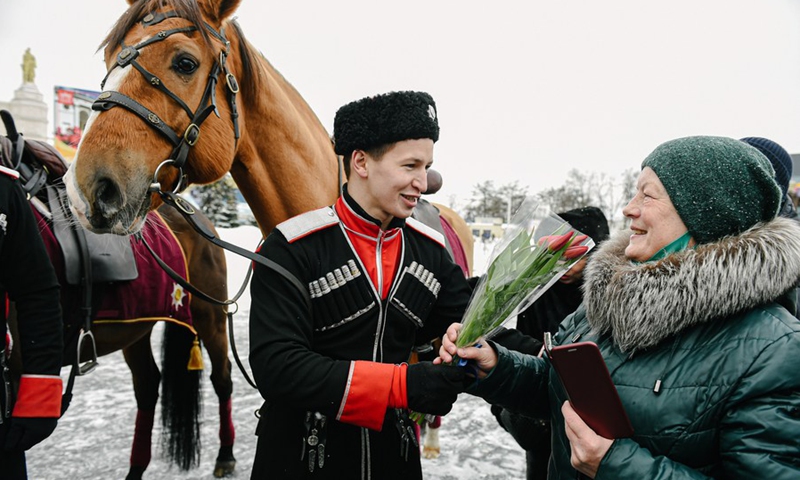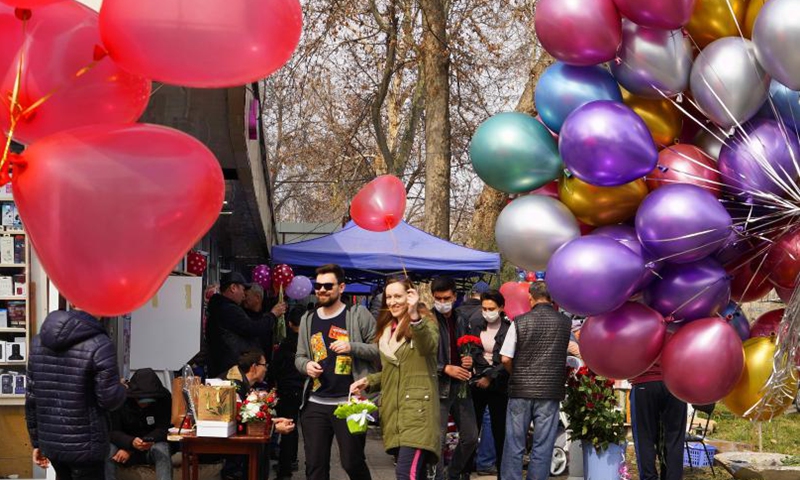UN Women data reveals women's leadership under threat by COVID-19 pandemic

Contestants attend a race to mark the International Women's Day held in Zhodzina, Belarus, March 8, 2021. (Photo: Xinhua)

A rider of the Kremlin Equestrian School gives tulips to a woman in Moscow, Russia on March 8, 2021.(Photo: Xinhua)

A woman holds a basket of flowers and a balloon in a street in Tashkent, Uzbekistan, March 8, 2021.(Photo: Xinhua)
The latest data published Monday by UN Women, a United Nations entity working for the empowerment of women, shows that women's rights and leadership are under threat, even more due to the COVID-19 pandemic.
Current projections show that gender equality in the highest positions of power will not be reached for another 130 years. This year's International Women's Day rings the alarm on rising threats to gender equality and highlights the need to build back better for a more gender-equal future, according to a press release.
"We must remember 2021 as a global inflection point on gender equality -- a year when women's rights and leadership accelerated irreversibly. The Generation Equality Forum will be a catalyst for lasting change. A more equal world will be a different world. More inclusive decisions will be made, different voices heard, and different solutions created," said UN Women Executive Director Phumzile Mlambo-Ngcuka.
The Generation Equality Forum is a civil society-centred, global gathering for gender equality, convened by UN Women and co-hosted by the governments of Mexico and France. Kicking off in Mexico City, Mexico, on March 29-31, and culminating in Paris, France, in June, the forum will secure a set of concrete, ambitious, and transformative commitments to achieve immediate and irreversible progress toward gender equality. The landmark effort will bring together governments, corporations and change to define and announce ambitious investments and policies.
"Gender equality is essentially a question of power. A male-dominated world and a male-dominated culture will yield male-dominated results. But the opportunity of man-made problems -- and I choose these words deliberately -- is that they have human-led solutions. These solutions can only be found through shared leadership and decision-making; and through the full realization of women's rights, including the right to equal participation. Realizing women's rights will benefit all of us," said UN Secretary-General Antonio Guterres.
This International Women's Day comes at a moment where evidence is growing that the pandemic is having a disproportionate and severe impact on women's rights -- from their role as front-line healthcare workers often without adequate protection, to the loss of jobs as the informal economy shrinks, and the alarming spike in domestic violence and unpaid care burden.
The press release said that striking new data on women's leadership further emphasizes the imperative for action. Major facts are that only three countries globally have 50 percent or more women in parliament, and the same amount have no women in parliament at all; women under 30 years make up less than one percent of parliamentarians globally; and women parliamentarians reported in one survey that they experienced nearly twice as much exposure to torture, ill treatment and acts of violence compared to men.
Research shows that when women are in power, overlooked policy issues, such as ending violence against women, childcare services and healthcare get more attention; there is often less government corruption and political parties are more likely to work together. For example, in Liberia during her first term as president, Ellen Johnson Sirleaf introduced a specialized court to prosecute violence against women. Norway's former Prime Minister Gro Harlem Brundtland, and current German Chancellor Angela Merkel, both strengthened family leave provisions and increased funding for early childhood education.
The Generation Equality Forum's Action Coalition on Feminist Movements and Leadership has developed plans to achieve gender parity in executive and legislative positions in 50 countries by 2026.
UN Women has also put forth a series of concrete recommendations from improving legal frameworks, especially through adopting and enforcing gender quotas, addressing social norms and violence against women in public life, and increasing funding to support women candidates.
Launching on International Women's Day, the actions of the Action Coalitions, which will be a main deliverable of the upcoming Generation Equality Forum, will define the most catalytic areas for investment in advancing gender equality. The coalitions will seek a wide range of commitments from diverse organizations -- governments, nonprofits, corporations and youth leaders -- on six themes ranging from Feminist Movements and Leadership to Gender-based Violence, to accomplish lasting gender equality.
